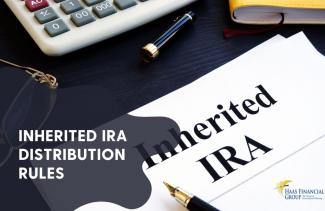
Inherited IRA Distribution Rules
A tricky subject that comes up in our meetings is around inherited IRA distribution rules. This used to be pretty clear-cut on how to handle, but a 2019 law changed all that and may make it a confusing subject (even for financial advisors).
There are basically two major groups a person falls into when inheriting an IRA – you were either a spousal beneficiary or non-spousal beneficiary. Spousal beneficiaries were able to assume ownership of the IRA and "re-title" it in their name which usually meant no distributions were required OR distributions could be taken over their lifetime. While a non-spouse beneficiary would start taking Required Minimum Distributions (RMDs) each year based on a table/calculation using the beneficiary's age. This method led to the inherited IRAs being called "stretch IRAs" because you could stretch the IRA distributions throughout a person's lifetime.
The Secure Act passed in 2019 changed a few items. It did not change much for spouses that will inherit IRAs, but it significantly changed the “stretch” IRA required distributions. Now any non-spousal inherited IRA account must be completely depleted within 10 years. The IRS then went further and said if you inherit an IRA, and the original owner was already taking RMDs (typically over the age of 70.5) the beneficiary would need to also take RMDs over those 10 years. The IRS knew this was confusing and because they weren’t initially clear about the rules, any RMDs that weren’t taken in 2021 and 2022 will avoid the penalty (50%!!!) on any missed distributions.
So how does this affect you if you have an inherited IRA? See what applies to you and find the answer below (some choices are not so clear cut so always contact us for answers to your specific questions):
Did you inherit your IRA prior to 2020?
The Secure Act change does not affect you and you should continue to take the RMD's based on your life expectancy. If you did not start taking RMDs you can likely avoid excise penalties by making sure the IRA account is liquidated within 5 years either through yearly withdrawals or in one lump sum. Schedule a call with us if you have not begun taking RMD's in this situation.
Did you inherit in 2020 or after and the decedent was already taking RMDs?
You will have to distribute the entirety of the account by the tenth year after the decedent's death AND you will need to take yearly RMDs. No penalty will apply to any missed RMDs in 2021 or 2022
What if the original owner (decedent) had not yet begun taking RMDs?
You will need to have the account liquidated by the end of the tenth year. RMDs are not necessary but it may be beneficial to take distributions over time to avoid a large lump sum later and avoid potentially higher taxes from the distribution. For example, let's say you are single, make $75K income/year (22% Tax bracket), you take approximately $10K out each year and stay in your current bracket. Alternatively, you leave everything in the account for ten years – invested moderately at 5% - you would have to withdraw about $160,000 in that tenth year. Your total income that year is $235,000 ($75+$160) bumping you to the 35% bracket – and therefore adding to your federal tax burden.
Was your spouse the owner of the IRA?
- You can assume the IRA as yours and avoid the 10-year liquidation/RMD rule. When you turn 72 you will need to start RMDs based on your age.
- You can choose to not assume the IRA as your own and the distribution rules detailed above will apply to you.
Are there any exceptions to what is outlined above?
There are some exceptions for beneficiaries that are chronically ill/disabled, less than 10 years younger than the original owner, minor children, and if a Charity, Trust, or the estate inherit the IRA. These cases are complex and we recommend you contact us to discuss further.
You can check out the handy chart below for snapshot of everything outlined here.
Tracking # T004779
Investment Advice offered through Great Valley Advisor Group, a Registered Investment Advisor. Great Valley Advisor Group and Haas Financial Group are separate entities. This is not intended to be used as tax or legal advice. Please consult a tax or legal professional for specific information and advice.

